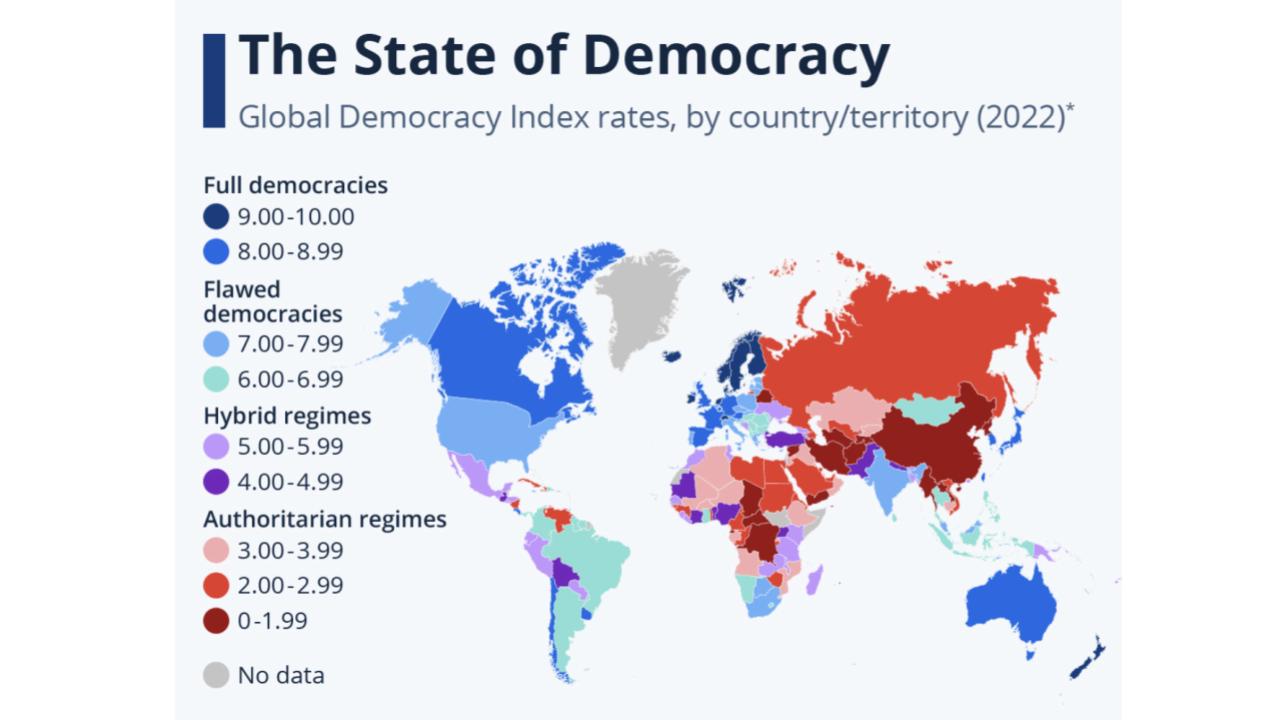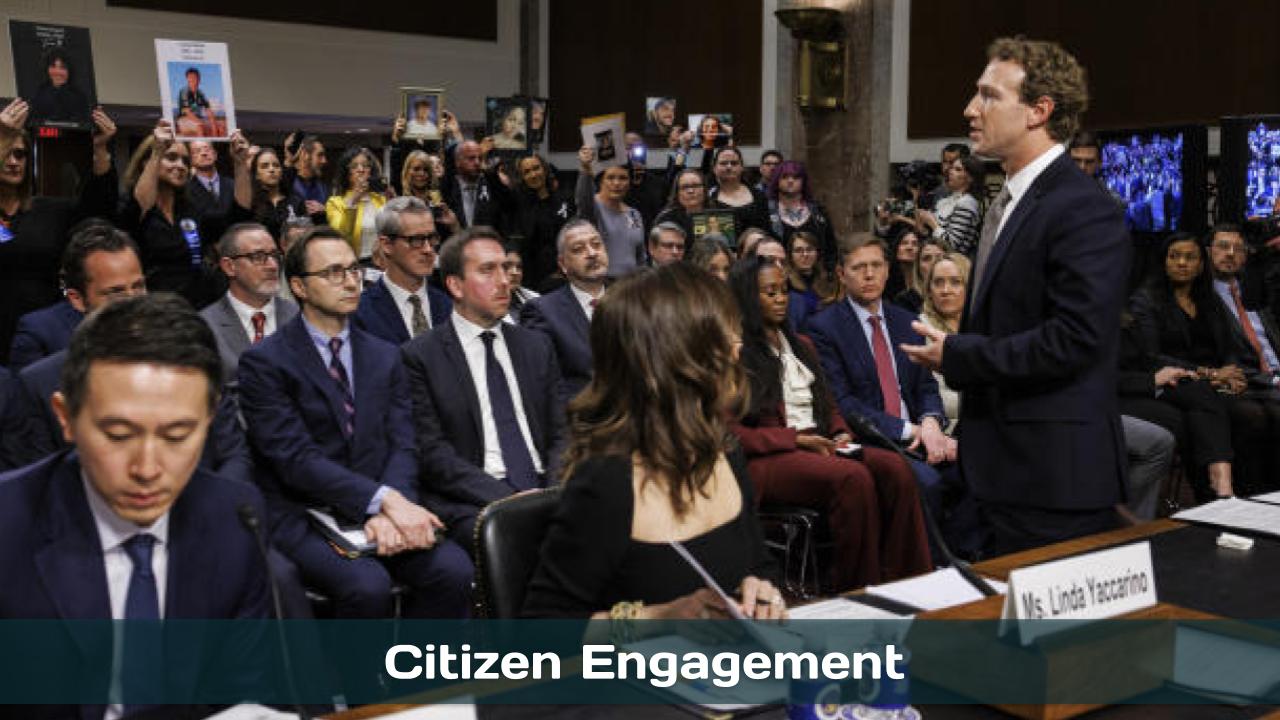Summary
Democracy, derived from the Greek words “demos” (people) and “kratos” (power), fundamentally means “rule by the people”. It’s a system of governance where citizens collectively decide on laws, policies, leadership, and major undertakings of the state, either directly or through elected representatives.
OnAir Post: Democracies
About
Source: Gemini AI Overview
Key principles
- Popular Sovereignty
Power ultimately resides with the people. - Equality
All citizens have an equal opportunity to influence decisions that affect society. - Individual Autonomy
People should be able to control their own lives (within reason) and not be subject to arbitrarily imposed rules. - Rule of Law
Everyone, including those in power, is subject to the law. - Fundamental Rights
Democracies typically guarantee basic human rights and civil liberties, including freedom of speech, assembly, and religion. - Accountability
Leaders are accountable to the people, often through mechanisms like elections.
Types of democracies
- Direct Democracy
Citizens directly participate in decision-making, such as voting on policy initiatives. Switzerland has a direct democracy system where citizens receive ballot papers and information brochures for each vote. - Representative Democracy
Citizens elect representatives to govern on their behalf, according to ScienceABC. This is the most common form today.
Within representative democracies, further distinctions exist
- Parliamentary Democracy
- The head of government is chosen from the elected legislature (parliament).
- Presidential Democracy
The head of government (president) is popularly elected and separate from the legislature. - Constitutional Monarchy
A system with a monarch whose power is limited by a constitution, with democratic governance typically exercised by an elected parliament.
Why democracy matters
- Economic Opportunity
Democracies generally foster stronger, more stable economies. - Health and Well-being
Democracies are associated with better health outcomes, including increased life expectancy and lower infant mortality rates. - Human and Civil Rights
Democracies excel at protecting fundamental human rights and civil liberties, including for minorities. - Peace and Stability
Democracies are less likely to engage in war with each other and experience less civil conflict. - Good Governance
Over time, democracies tend to have lower levels of corruption and more responsive and effective governments.
Challenges
Initial Source for content: Gemini AI Overview 7/28/25
[Enter your questions, feedback & content (e.g. blog posts, Google Slide or Word docs, YouTube videos) on the key issues and challenges related to this post in the “Comment” section below. Post curators will review your comments & content and decide where and how to include it in this section.]
1. Erosion of democratic norms and institutions
- Rise of populism and illiberal leaders
Elected officials increasingly undermine democratic institutions and norms once in power, according to Harvard Kennedy School. This can involve attacks on the media, judiciary, and independent institutions like anti-corruption bodies. - Politicization of independent institutions
Governments in some democracies are weakening independent institutions such as the media and judiciary by politicizing their functions or undermining their independence. - Weakening of checks and balances
Elected leaders are increasingly seeking to circumvent or dismantle established checks and balances, leading to a concentration of power in the executive branch.
2. Polarization and societal division
- Intensifying political polarization
Societies are experiencing deepening divisions along ideological, social, and economic lines, leading to a climate of distrust and animosity between opposing political groups. This polarization can hinder cooperation and compromise, making it more challenging to address pressing issues. - Affective polarization
Beyond ideological differences, emotional animosity and dislike towards opposing partisan groups are on the rise, according to Wikipedia. This affective polarization can further exacerbate societal divisions and make compromise more difficult.
3. Disinformation and information manipulation
- Misinformation and disinformation campaigns
The spread of false or misleading information, often amplified through social media and even by AI-generated content, poses a significant threat to democratic processes. Foreign actors are actively engaged in these campaigns to sow discord, influence elections, and undermine trust in democratic institutions. - Challenges to election integrity
The prevalence of disinformation and efforts to manipulate information can undermine public trust in the fairness and legitimacy of elections.
4. Inequality and economic challenges
- Economic inequality and democratic discontent
Rising economic inequality, exacerbated by factors like globalization and deregulation, can lead to widespread public dissatisfaction and undermine trust in democratic institutions. This can be further exploited by populist leaders who blame outsiders or the system for these inequalities. - Unequal political influence
Economic inequality can translate into unequal political influence and representation, leading to a decline in citizens’ perceptions of external efficacy and trust in the fairness of democratic processes.
5. External threats
- Foreign interference
Nation-states and other foreign actors engage in a range of activities to disrupt or influence elections, including spreading disinformation and hacking political infrastructure. - Rise of authoritarianism and military coups
While less common than in the past, some countries continue to experience backsliding towards authoritarian rule or military takeovers. - Armed non-state actors
Violence and instability caused by armed non-state groups, including militias, terrorist groups, and criminal organizations, pose a significant threat to freedom and security, notes Freedom House. This can also make democratic participation dangerous and lead to the elevation of leaders who restrict freedom in pursuit of order.
Innovations
Initial Source for content: Gemini AI Overview 7/28/25
[Enter your questions, feedback & content (e.g. blog posts, Google Slide or Word docs, YouTube videos) on innovative research related to this post in the “Comment” section below. Post curators will review your comments & content and decide where and how to include it in this section.]
Key challenges and research areas
- Democratic Backsliding and Resilience
Examining the causes and consequences of democratic decline and developing interventions to rebuild and strengthen democratic institutions. This includes strengthening election management bodies, promoting inclusive political participation, and fostering accountable governance. - Political Polarization and Disinformation
Addressing the growing divides within societies and the spread of misinformation and disinformation that undermines trust in democratic processes and fuels political instability. Research focuses on understanding the mechanisms of disinformation and developing effective countermeasures, including media literacy, fact-checking, and combating harmful algorithms. - Technology’s Double-Edged Sword
While digital technologies offer opportunities for enhanced citizen engagement and participation (e.g., online platforms for deliberation and voting), they also present threats like the spread of disinformation and potential for manipulation. Research explores leveraging technology for positive impact while mitigating risks. - Institutional Innovation
Adapting traditional democratic institutions to better address modern challenges, including electoral reforms (e.g., ranked preference voting, internet voting), participatory institutions (e.g., participatory budgeting), and enhancing intra-party democracy. Research explores novel approaches like liquid democracy and crowdsourcing for lawmaking, according to Nature. - Inclusivity and Representation
Addressing underrepresentation and fostering the inclusion of diverse groups in political processes, including youth and women. Research explores quotas, educational programs, and other mechanisms to promote more equitable participation.
Innovations in action
- Deliberative Technology
Utilizing online platforms and AI-powered tools to facilitate constructive dialogue and informed decision-making, such as the Stanford Online Deliberation Platform and platforms employing generative AI for discussion analysis and visualization, according to the Freeman Spogli Institute for International Studies and People Powered – Global Hub for Participatory Democracy. - Secure Electronic Voting
Developing robust and accessible electronic voting systems with features like touch-screen interfaces, biometrics, encryption, and blockchain technology to enhance security, efficiency, and accessibility. - AI for Voter Engagement and Administration
Employing AI to provide personalized voter information, target messaging, automate voter registration, and detect potential fraud. - Supporting Local Journalism
Recognizing the critical role of local news in combating disinformation, efforts are underway to invest in and bolster local journalism outlets.
Projects
Numerous initiatives are underway to address challenges facing democracies, including democratic backsliding, declining trust in institutions, and the impact of technology on civic engagement. These projects encompass a wide range of approaches, from leveraging digital tools to foster civic participation to strengthening democratic institutions and fostering a democratic culture.
Initial Source for content: Gemini AI Overview 7/28/25
[Enter your questions, feedback & content (e.g. blog posts, Google Slide or Word docs, YouTube videos) on current and future projects implementing solutions to this post challenges in the “Comment” section below. Post curators will review your comments & content and decide where and how to include it in this section.]
1. Strengthening democratic institutions and processes
- Combating democratic backsliding
Efforts are being made to strengthen legal frameworks and institutions to prevent the erosion of democratic norms and to safeguard checks on power. International IDEA offers recommendations for improving institutional design. - Improving elections
Initiatives focus on enhancing electoral integrity, increasing voter participation, and ensuring fair and transparent elections. Organizations like The Carter Center are involved in election observation and advocating for stronger electoral processes. - Enhancing accountability and oversight
Projects support civil society organizations and media outlets to hold governments accountable and expose wrongdoing. Brookings offers a toolkit to prevent and reverse democratic backsliding, highlighting the need for stronger accountability mechanisms.
2. Leveraging technology for democratic innovation
- Promoting citizen participation
Digital platforms and tools are being developed to enable citizens to engage more actively in political processes, such as online voting, forums for deliberation, and platforms for gathering citizen input on policy decisions. - Enhancing transparency and open government
Technology is used to increase transparency in government operations, track public spending, and make information more accessible to citizens. - Combating disinformation and manipulation
Efforts are being made to improve media literacy, develop tools for fact-checking, and counter the spread of disinformation online. - Addressing digital divides
Projects aim to ensure that technology advances are accessible to all communities, including providing robust internet connectivity and digital literacy programs.
3. Fostering a democratic culture and citizen engagement
- Educating for democracy
Programs focus on building a democratic culture and demand for democracy among the public, particularly among youth. - Strengthening civil society
Initiatives support the organization and professionalization of civil society groups to advocate for their causes and hold governments accountable. - Promoting dialogue and deliberation
Creating spaces for meaningful dialogue and deliberation among citizens and between citizens and government is crucial to addressing polarization and building consensus. Deliberative mini-publics are an example of this, notes Cambridge University Press & Assessment.
Examples of projects and initiatives
- USAID’s Advancing Digital Democracy Initiative
This initiative fosters open, secure, and inclusive digital societies where technology supports democratic principles and human rights, expanding pilot programs to multiple countries in Africa, Asia, Europe, and Latin America. - The National Endowment for Democracy (NED)
NED makes grants to non-governmental groups worldwide that are working to strengthen democratic institutions and goals in over 90 countries. - The Global Democracy Coalition
This alliance of over 150 organizations works to advance and protect democracy globally through collaboration and innovative solutions. - The Democracy Playbook
This initiative by Brookings and the Transatlantic Democracy Working Group provides tools and strategies to prevent and reverse democratic backsliding. - Deliberative Mini-Publics
These representative bodies of ordinary citizens are used to deliberate on specific issues and offer recommendations, fostering informed public discussion and increasing trust in democratic processes.



